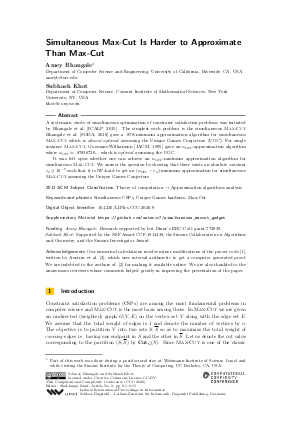Simultaneous Max-Cut Is Harder to Approximate Than Max-Cut
Authors Amey Bhangale, Subhash Khot
-
Part of:
Volume:
35th Computational Complexity Conference (CCC 2020)
Part of: Series: Leibniz International Proceedings in Informatics (LIPIcs)
Part of: Conference: Computational Complexity Conference (CCC) - License:
 Creative Commons Attribution 3.0 Unported license
Creative Commons Attribution 3.0 Unported license
- Publication Date: 2020-07-17
File

PDF
LIPIcs.CCC.2020.9.pdf
- Filesize: 0.72 MB
- 15 pages
Document Identifiers
Subject Classification
ACM Subject Classification
- Theory of computation → Approximation algorithms analysis
Keywords
- Simultaneous CSPs
- Unique Games hardness
- Max-Cut
Metrics
- Access Statistics
-
Total Accesses (updated on a weekly basis)
0PDF Downloads0Metadata Views
Abstract
A systematic study of simultaneous optimization of constraint satisfaction problems was initiated by Bhangale et al. [ICALP, 2015]. The simplest such problem is the simultaneous Max-Cut. Bhangale et al. [SODA, 2018] gave a .878-minimum approximation algorithm for simultaneous Max-Cut which is almost optimal assuming the Unique Games Conjecture (UGC). For single instance Max-Cut, Goemans-Williamson [JACM, 1995] gave an α_GW-approximation algorithm where α_GW ≈ .87856720... which is optimal assuming the UGC.
It was left open whether one can achieve an α_GW-minimum approximation algorithm for simultaneous Max-Cut. We answer the question by showing that there exists an absolute constant ε₀ ≥ 10^{-5} such that it is NP-hard to get an (α_GW- ε₀)-minimum approximation for simultaneous Max-Cut assuming the Unique Games Conjecture.
Cite As Get BibTex
Amey Bhangale and Subhash Khot. Simultaneous Max-Cut Is Harder to Approximate Than Max-Cut. In 35th Computational Complexity Conference (CCC 2020). Leibniz International Proceedings in Informatics (LIPIcs), Volume 169, pp. 9:1-9:15, Schloss Dagstuhl – Leibniz-Zentrum für Informatik (2020)
https://doi.org/10.4230/LIPIcs.CCC.2020.9
BibTex
@InProceedings{bhangale_et_al:LIPIcs.CCC.2020.9,
author = {Bhangale, Amey and Khot, Subhash},
title = {{Simultaneous Max-Cut Is Harder to Approximate Than Max-Cut}},
booktitle = {35th Computational Complexity Conference (CCC 2020)},
pages = {9:1--9:15},
series = {Leibniz International Proceedings in Informatics (LIPIcs)},
ISBN = {978-3-95977-156-6},
ISSN = {1868-8969},
year = {2020},
volume = {169},
editor = {Saraf, Shubhangi},
publisher = {Schloss Dagstuhl -- Leibniz-Zentrum f{\"u}r Informatik},
address = {Dagstuhl, Germany},
URL = {https://drops.dagstuhl.de/entities/document/10.4230/LIPIcs.CCC.2020.9},
URN = {urn:nbn:de:0030-drops-125610},
doi = {10.4230/LIPIcs.CCC.2020.9},
annote = {Keywords: Simultaneous CSPs, Unique Games hardness, Max-Cut}
}
Author Details
- Department of Computer Science and Engineering, University of California, Riverside, CA, USA
Funding
- Bhangale, Amey: Research supported by Irit Dinur’s ERC-CoG grant 772839.
- Khot, Subhash: Supported by the NSF Award CCF-1813438, the Simons Collaboration on Algorithms and Geometry, and the Simons Investigator Award.
Acknowledgements
Our numerical calculations involve minor modifications of the prover code [Austrin et al.], written by [Austrin et al., 2016], which uses interval arithmetic to get a computer generated proof. We are indebted to the authors of [Austrin et al., 2016] for making it available online. We are also thankful to the anonymous reviewers whose comments helped greatly in improving the presentation of the paper.
Supplementary Materials
References
- Per Austrin, Siavosh Benabbas, and Konstantinos Georgiou. Max-bisection analysis - prover code. https://github.com/austrin/max-bisection-analysis/. Accessed: 08-May-2020.
- Per Austrin, Siavosh Benabbas, and Konstantinos Georgiou. Better balance by being biased: A 0.8776-approximation for max bisection. ACM Trans. Algorithms, 13(1):1-27, 2016. URL: https://doi.org/10.1145/2907052.
- Per Austrin, Subhash Khot, and Muli Safra. Inapproximability of vertex cover and independent set in bounded degree graphs. Theory of Computing, 7(3):27-43, 2011. URL: https://doi.org/10.4086/toc.2011.v007a003.
- Per Austrin and Aleksa Stankovic. Global cardinality constraints make approximating some max-2-csps harder. In Approximation, Randomization, and Combinatorial Optimization. Algorithms and Techniques, APPROX/RANDOM 2019, pages 24:1-24:17, 2019. URL: https://doi.org/10.4230/LIPIcs.APPROX-RANDOM.2019.24.
- Amey Bhangale and Subhash Khot. Simultaneous max-cut dictatorship gadget - prover code. https://github.com/asteric7/simultaneous_maxcut_gadget. Accessed: 08-May-2020.
- Amey Bhangale, Subhash Khot, Swastik Kopparty, Sushant Sachdeva, and Devanathan Thiruvenkatachari. Near-optimal approximation algorithm for simultaneous max-cut. In Proc. 29th Annual ACM-SIAM Symposium on Discrete Algorithms, (SODA), pages 1407-1425, 2018. URL: https://doi.org/10.1137/1.9781611975031.93.
- Amey Bhangale, Swastik Kopparty, and Sushant Sachdeva. Simultaneous approximation of constraint satisfaction problems. In Automata, Languages, and Programming - 42nd International Colloquium, (ICALP), Proceedings, Part I, pages 193-205, 2015. URL: https://doi.org/10.1007/978-3-662-47672-7_16.
- Irit Dinur, Elchanan Mossel, and Oded Regev. Conditional hardness for approximate coloring. SIAM Journal on Computing, 39(3):843-873, 2009. URL: https://doi.org/10.1137/07068062X.
- Michel X. Goemans and David P. Williamson. Improved approximation algorithms for maximum cut and satisfiability problems using semidefinite programming. J. ACM, 42(6):1115–1145, 1995. URL: https://doi.org/10.1145/227683.227684.
- Venkatesan Guruswami, Johan HÅstad, Rajsekar Manokaran, Prasad Raghavendra, and Moses Charikar. Beating the random ordering is hard: Every ordering csp is approximation resistant. SIAM Journal on Computing, 40(3):878-914, 2011. URL: https://doi.org/10.1137/090756144.
- Subhash Khot. On the power of unique 2-prover 1-round games. In Proc. 34th Annual ACM symposium on Theory of computing (STOC), pages 767-775. ACM, 2002. URL: https://doi.org/10.1145/509907.510017.
- Subhash Khot, Guy Kindler, Elchanan Mossel, and Ryan O’Donnell. Optimal inapproximability results for max‐cut and other 2‐variable csps? SIAM Journal on Computing, 37(1):319-357, 2007. URL: https://doi.org/10.1137/S0097539705447372.
- Elchanan Mossel. Gaussian bounds for noise correlation of functions. Geometric and Functional Analysis, 19(6):1713-1756, 2010. URL: https://doi.org/10.1007/s00039-010-0047-x.
- Elchanan Mossel, Ryan O'Donnell, and Krzysztof Oleszkiewicz. Noise stability of functions with low influences: invariance and optimality. In Proc. 46th Annual IEEE Symposium on Foundations of Computer Science (FOCS), pages 21-30. IEEE, 2005. URL: https://doi.org/10.1109/SFCS.2005.53.
-
Henrik Sjögren. Rigorous analysis of approximation algorithms for max 2-csp. Master’s thesis, 2009.

- Uri Zwick. Computer assisted proof of optimal approximability results. In Proc. 13th Annual ACM-SIAM Symposium on Discrete Algorithms, (SODA), pages 496-505, 2002. URL: http://dl.acm.org/citation.cfm?id=545381.545448.
